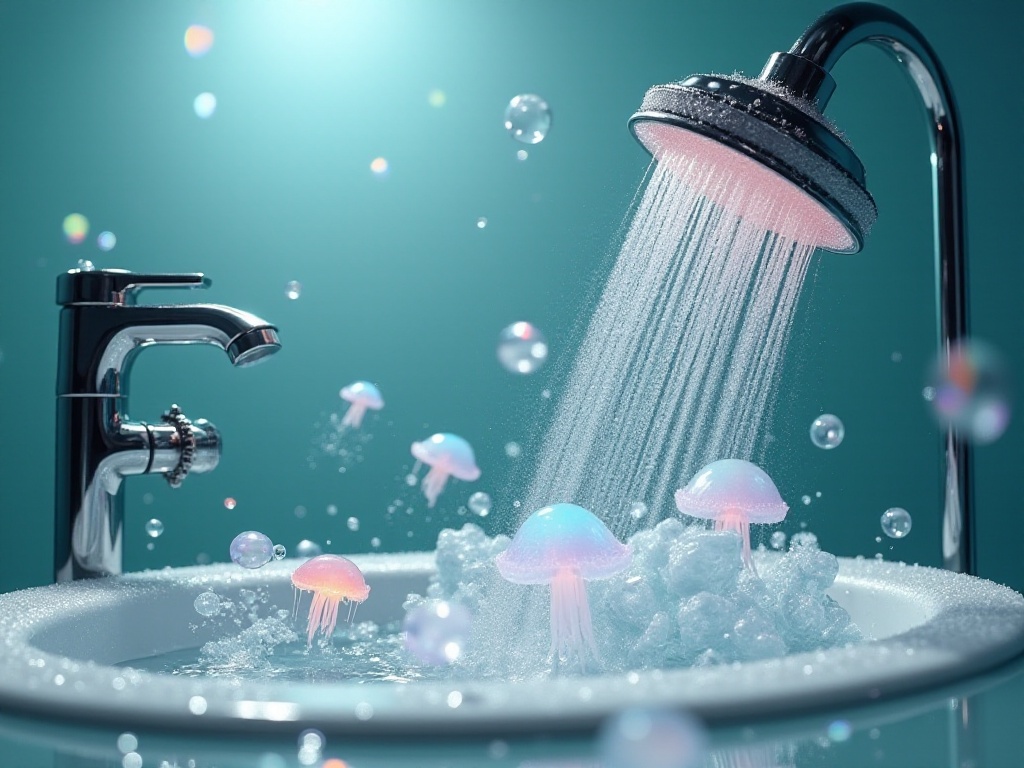Introduction
Fellow friends, today I want to share a super practical topic: how to scientifically maintain your home. I believe many young people who, like me, are just starting to live independently, encounter situations where things break or leak at home but don't know where to start. Or like me, always wait until there's a problem before scrambling to fix it. After years of exploration and learning, I've finally summarized a set of practical home maintenance tips to share with everyone.
Safety First
When it comes to home maintenance, safety equipment inspection must be the top priority. I remember when I first moved into my new house, I had no idea about regularly checking these safety devices. Until last year when my smoke alarm suddenly went off in the middle of the night, scaring both me and my roommate. Later we found out it was just low battery, which served as a wake-up call. Since then, I've developed a good habit of regular checks.
Monthly safety checks are actually very simple - just press the test buttons on smoke detectors and carbon monoxide detectors. Hearing the "beep" sound means everything is normal. I now set the 1st of each month as "Safety Day," spending ten minutes checking these devices. Honestly, it felt very troublesome at first, but considering it's about the whole family's safety, those ten minutes are well worth it.
Electrical system inspection is equally important - it's no small matter. Every time I see news reports about fires caused by aging wires, I'm grateful for sticking to these inspections. According to statistics, about 51,000 home fires in the US are caused by electrical malfunctions each year - a truly alarming number. So now I test all GFCI outlets monthly, especially in wet areas like kitchens and bathrooms. I also check all electrical cords for wear, particularly in frequently bent areas like phone charging cables.
Recently, I discovered a particularly useful tip: touch each outlet and switch plate - if it feels particularly hot, that's a warning sign of possible poor contact or overload. I recommend everyone try this method; it really works.
Safety equipment maintenance also includes checking door and window locks. I hadn't paid attention to this until I found my balcony door lock was loose. Upon careful inspection, I discovered all the screws had loosened. Since then, I check all door locks monthly to ensure the screws are tight. This small detail is really important, especially for those living on lower floors.

Core Systems

Air Conditioning Maintenance
The air conditioning system is absolutely a "major item" in our homes - when used properly, it makes our lives comfortable; when not, it wastes electricity and breaks easily. Through years of exploration, I've summarized a simple "three-step" strategy.
First step: monthly replacement or cleaning of AC filters. This is so important! I didn't know before that dirty filters can increase electricity bills by 20-30%. Now I take down the filter monthly to vacuum it and then rinse with clean water. Special reminder: the filter must be completely dry before reinstalling, otherwise bacteria might grow.
Here's a little trick I discovered: when cleaning the filter, use an old toothbrush to gently brush it - this can remove dust stuck in the crevices. The effect is excellent and doesn't damage the filter at all.
Second step: regularly clean dust around the AC unit. This is super simple - just use a vacuum cleaner to clean around the outdoor unit. I didn't know before that dust accumulation around the outdoor unit affects heat dissipation. After cleaning, the AC's cooling is noticeably more effective.
By the way, be careful when cleaning the outdoor unit, especially if you live in high-rise buildings. If the outdoor unit is installed in a hard-to-reach place, it's better to call professionals. Safety first!
Third step: have professionals do a deep maintenance annually. Honestly, I felt this expense was quite painful at first, but thinking about how repairs would cost more if the AC breaks down, this investment is worth it. Professional AC technicians will help clean the indoor unit, add refrigerant, and check the condition of all parts. My AC has been maintained this way for three years and still runs great.
Here's a money-saving tip: many AC brands have annual inspection discount events, usually during seasonal changes. I always pay attention in advance and schedule maintenance during these events to save quite a bit of money.

Plumbing Maintenance
Plumbing issues are really a pain point for many households, especially for young renters like us. But once you master the correct maintenance methods, it's not difficult to solve.
First, let's talk about toilet issues. I have a particularly useful trick: drop some food coloring in the toilet tank - if colored water appears in the bowl after an hour, your toilet is secretly leaking. This method is both economical and practical, and won't damage the toilet at all.
The first time I used this method, I discovered my toilet was indeed leaking. Timely repair not only saved on water bills but also prevented bigger problems. Later I taught this to my friends, and they all said this trick was super useful.
For rarely used bathrooms, remember to flush the toilet and run the faucets weekly. It's like exercising the pipes, keeping the "muscles" from getting stiff. I once neglected this and ended up with a clogged drain in a rarely used bathroom, spending quite a bit on repairs.
Faucet maintenance is also important. If you notice reduced water flow, it's likely due to mineral buildup in the aerator. My solution is to remove the aerator, soak it in white vinegar for an hour, then gently scrub with a toothbrush - good as new.
Kitchen drains need special attention. I've developed a habit of using a strainer to filter out food debris before washing dishes, which effectively prevents pipe blockages. I also use a specialized drain cleaner monthly - prevention is better than cure.

Moisture Control
Bathroom Maintenance
The bathroom is the most prone to mold in the house, which I know from experience. When I first started living alone, I had no idea about bathroom ventilation, and the corners quickly got moldy. After doing a lot of research, I finally found effective solutions.
First, always run the exhaust fan or open windows for at least 15 minutes after showering. This timing is crucial because hot air takes time to dissipate. According to surveys, over 60% of household bathrooms have varying degrees of mold problems, mainly due to insufficient ventilation.
My current practice is to turn on the exhaust fan before showering and continue for 15 minutes after. Although it uses more electricity, compared to dealing with mold, this investment is really nothing.
Shower head problems are also annoying. I discovered a super practical descaling method: pour white vinegar in a bag, attach it to the shower head overnight, and it's like new the next day. I've used this trick many times with great results. Plus, white vinegar is cheap and eco-friendly, much more economical than buying specialized descaling agents.
Bathroom tile grout is also easily overlooked. I now scrub the grout weekly with a toothbrush dipped in baking soda solution - this keeps it clean and prevents mold.
Here's a recent discovery: placing a dehumidifier box in the bathroom effectively controls humidity. Although it needs periodic replacement, the effect is really good. This is especially useful for bathrooms without windows.
Dehumidifying Bedrooms and Living Rooms
Besides bathrooms, dehumidifying other rooms is also important. My home gets especially humid during the rainy season, but I've developed an effective set of methods.
First is regular window ventilation - the most basic and important step. I usually open windows in the morning on sunny days when air humidity is relatively low. 15-20 minutes of ventilation is enough to ensure air circulation without causing too much temperature change.
Second is proper furniture placement. My wardrobe used to be right against the wall, resulting in water condensation behind it. After moving it slightly away from the wall to create ventilation space, the problem was solved.
Then there's choosing appropriate decorations. I now keep some moisture-absorbing plants like bamboo palm and aloe vera, which both beautify the environment and regulate humidity. However, note that these plants also need proper watering - not too much.
Clever Cleaning
When it comes to appliance maintenance, cleaning is absolutely crucial. I've summarized some particularly useful cleaning methods to share.
Refrigerator maintenance is especially important. Cleaning the door seals and condenser every three months can save over 15% on electricity. When cleaning the seals, I use a toothbrush with warm water to gently scrub - this achieves thorough cleaning without damaging the seals.
Condenser cleaning is also key. I use the vacuum cleaner's crevice tool to remove accumulated dust. After cleaning, the refrigerator noticeably runs more quietly.
I really neglected washing machine maintenance before. Until one time clothes came out smelling strange, I realized the seriousness of the problem. Now I wipe the rubber door seal weekly with a damp cloth to prevent mold and odors.
Monthly, I run an empty cycle with specialized washing machine cleaner to remove drum residue. This is particularly effective for eliminating washing machine odors.
I have a trick for microwave cleaning: put some water and lemon slices in a bowl, microwave for 2 minutes - the steam softens stubborn stains, making them easier to wipe. Plus, the lemon fragrance eliminates odors - two birds with one stone.
Range hood cleaning is a big job, but there are simple methods. I lay newspaper on the wall around the hood before cooking - oil smoke sticks to the paper, saving the trouble of wall cleaning.
For the hood filters, I found dishwasher cleaning works particularly well. First wipe off surface grease with kitchen paper, then wash at highest temperature in the dishwasher - the filters come out like new.

Seasonal Maintenance
Different seasons require different maintenance focuses. I've created a maintenance plan based on the four seasons.
Spring is the best time for deep cleaning. Focus on cleaning AC filters and checking window screens to prepare for summer. I clean all windows to let more sunlight in.
Summer mainly involves moisture control. Besides the dehumidifying measures mentioned earlier, I regularly check waterproofing, especially around balconies and windows. During rain, I pay special attention to any leaks.
Fall is for winter preparation. Check door and window seals, replacing worn ones promptly. I test with paper - if it pulls easily through gaps, the seal isn't good enough.
Winter focuses on heating. I check all heating equipment to ensure proper operation. Clean dust from electric heaters before use to avoid odors. If you have floor heating, test run in fall to address any issues early.
Emergency Handling
In home maintenance, emergency response is also important. I've organized solutions for common problems.
Burst pipes are the most common emergency. First, know where the main valve is - shut it off immediately when leaks occur. I put clear markings by the main valve and informed all residents.
Prepare for electrical shorts too. Everyone should know the circuit breaker location - I keep a flashlight nearby for power outages.
For toilet clogs, try a plunger first. If that fails, call professionals promptly. I keep a plunger ready just in case.
Tool Preparation
All these maintenance methods need proper tools. Here are some essential recommendations.
Basic tools include: screwdriver set, adjustable wrench, pliers, hammer. These tools solve most simple repairs.
For cleaning tools: besides common mops and cloths, consider a good vacuum cleaner. I think investing in a vacuum cleaner is definitely worth it.
Specialized tools: plunger, drain cleaner, electrical tape, etc. - these are essential for specific problems.
Summary and Outlook
Through this practice period, I deeply feel that home maintenance isn't actually difficult - the key is establishing regular inspection habits. I've made these inspection items into a checklist, completing them monthly, and the home really gets more comfortable to live in.
Honestly, when first implementing these maintenance plans, I also found it very troublesome. But after persisting, I discovered it not only saves money but also prevents many unexpected problems. Now whenever I see the neat and orderly state of my home, I feel especially good.
Finally, I want to say that while these maintenance tasks seem tedious, they're all for us to live more securely at home. After all, home is our life's harbor, worth our careful care. I hope these experiences help everyone, and welcome you to share your own home maintenance tips in the comments. Let's create a warm and comfortable home together!




